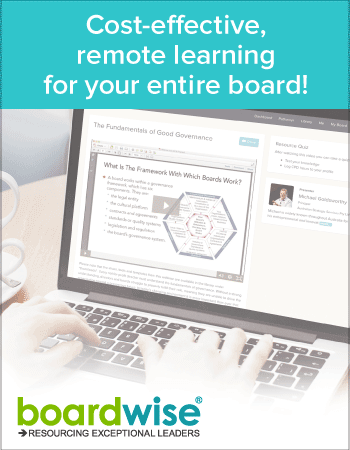strategy-risk
Strategy – Is it really that difficult?
Published: June 12, 2023
Read Time: 5 minutes

In recent years, serious concerns have been raised by governance experts and public inquiries over the amount of time spent by NFP boards monitoring the day-to-day operations of their organisations at the expense of driving long-term strategy.1 There are a number of reasons directors may have felt constrained to a short-term outlook, including their organisations being under-resourced, heavily reliant on grants and donations and staffed by volunteers and employees of varying levels of experience. Alternatively, boards have not been fully equipped to contemplate or implement strategy because there was resistance to change within their organisations.
Recommendations from recent Royal Commissions, however, highlight that the board’s role in leading an organisation’s strategy is a responsibility that can no longer be ignored. Directors must now take a long-term view if they are to discharge their duties to act in good faith in the best interests of an organisation and to act with care and diligence.
The final reports of the Aged Care and Banking Royal Commissions advance the notion that directors only properly discharge their ‘best interests’ duty when they consider the long-term interests of all stakeholders in their organisation.2 This holistic approach extends to community and social interests being factored into an organisation’s strategy. This is evidenced by increasing pressure, particularly in the corporate sector, for boards to have a clear plan for how they can respond to climate change risk, and responsibly manage their organisation’s broader environmental impact.
Recent Royal Commissions also called into question the exercise of care and diligence by directors. Concerns were raised over board decisions being made without proper reference to strategy or organisational purpose, and an over-reliance by boards on the assurances of management.3 In these circumstances, directors were found by the inquiry to have failed in their governance role and contributed to the reputational damage of their organisations.
Practically speaking, this means that a board will need to direct its organisation to provide the board with a framework enabling the directors to embed strategy into their decision making in a manner that is measurable and through which they will be accountable to stakeholders. Boards could consider doing the following:
1. Making strategy an objective and mandate in governing documents
An organisation’s purposes as set out in its constitution should be simply expressed and clearly understandable. Supplementary policies can assist in explaining these purposes in greater detail and how they may be incorporated into an organisation’s operations.
Board and committee charters can also be framed in a way which guide directors and committee members to discharge their obligations in the context of the organisation’s purpose and strategy.
2. Development of a strategic plan
The role of boards in the initial formulation of strategy may vary across different organisations. In some organisations, directors may take an active role in the development of strategy, while in others, the board may rely on management to formulate strategy, and take on the role of testing and approving that strategy. Regardless of the mechanism by which strategy is developed, the board is responsible for approving and monitoring the implementation of an organisation’s strategy and embedding strategic thinking into organisational culture.
This can be achieved by documenting an organisation’s strategic plan in a way which includes a timetable for its delivery and identifies success measures. All of these should be communicated to stakeholders through steps as simple as publishing the plan on the organisation’s website or reporting progress towards strategic objectives in annual reports or through an organisation’s periodic newsletter.
Decisions across the organisation should always be implemented with regard to the strategic plan.
3. Strategy-focused board induction
As new directors assume all the responsibilities that come with the position as soon as they are appointed, boards should also ensure a tailored induction process is provided which properly reflects the circumstances of the organisation and its strategy.
4. Board papers and minutes
Board minutes of large institutions came under heavy scrutiny during the Banking Royal Commission for failing to accurately record important points of discussion. All organisations should implement a requirement for board papers and minutes to explain the rationale for key decisions by directors with reference to the organisation’s strategic goals.
Not only will this ensure directors consider strategy during discussions, but it allows boards to demonstrate accountability for their decisions, including the exercise of proper care and diligence, through official records.
5. Making time for strategy
No matter the mechanisms for the development of strategy, all boards are responsible for the implementation of strategy through their decision-making. An effective strategy must adapt to changes in an organisation’s operational environment, so boards should make time to discuss and review strategy separately from other matters to ensure they continue to act in the best interests of their organisations.
Board meetings should include strategy as a standing agenda item to ensure it is a topic for discussion at meetings. Many boards also reserve time in their annual calendars for discussion dedicated to strategy, such as through the holding of strategy days where organisational strategy is reviewed and adjusted as appropriate.
Key Takeaways:
-
It is now arguable that boards have a legal obligation to consider and implement strategy;
-
Strategy must be approached from a long-term perspective that considers the interests of all stakeholders of an organisation;
-
Strategy can be implemented in practice by:
- Expressing the organisation’s purpose clearly in its constitution and relating purpose to strategy in supplementary governance documents;
- Aligning decision-making with the strategic plan;
- Holding strategy-focused board induction;
- Embedding strategy in board papers and minutes; and
- Dedicating time to reviewing strategy.
This article was originally published in the Better Boards Conference Magazine 2023
-
Phil Butler, ‘Taking back control: putting strategy on the NFP agenda’, AICD Not-for-profit Governance Study (Web Page) < https://www.aicd.com.au/corporate-governance-sectors/not-for-profit/studies/taking-back-control-putting-strategy-on-the-nfp-agenda.html>; Royal Commission into Misconduct in the Banking, Superannuation and Financial Services Industry (Final Report, February 2019) vol 1, 400. ↩︎
-
Royal Commission into Misconduct in the Banking, Superannuation and Financial Services Industry (Final Report, February 2019) vol 1, 403; Royal Commission into Aged Care Quality and Safety (Final Report, March 2021) vol 1, 133. ↩︎
-
Royal Commission into Misconduct in the Banking, Superannuation and Financial Services Industry (Final Report, February 2019) vol 1, 396. ↩︎
Share this Article
Recommended Reading
Recommended Viewing
Author
-
Partner
Mills Oakley
- About
-
At the time of writing, Vera heads up the Sydney Not-for-Profit, Human Rights & Social Impact team at Mills Oakley. Acting for numerous charities, religious and not-for-profit organisations, Vera has 30 years’ experience in the legal profession.
In her work, Vera is well recognised for her expertise in assisting clients with governance and fundraising issues, restructuring and mergers and regularly advises on constitutions and ACNC/ATO endorsements. Vera has written several academic works, including a chapter within ‘Charity Law’ (2012, 2016 and 2018) published by Thompson Reuters.
Vera sits on numerous charity boards, associations and committees including the ACNC Professional User Group, the Community and Consumer Consultative Group, Cemeteries and Crematoria NSW, Everyday Justice and CatholicCare, Diocese of Parramatta.
Found this article useful or informative?
Join 5,000+ not-for-profit & for-purpose directors receiving the latest insights on governance and leadership.
Receive a free e-book on improving your board decisions when you subscribe.
Unsubscribe anytime. We care about your privacy - read our Privacy Policy .










